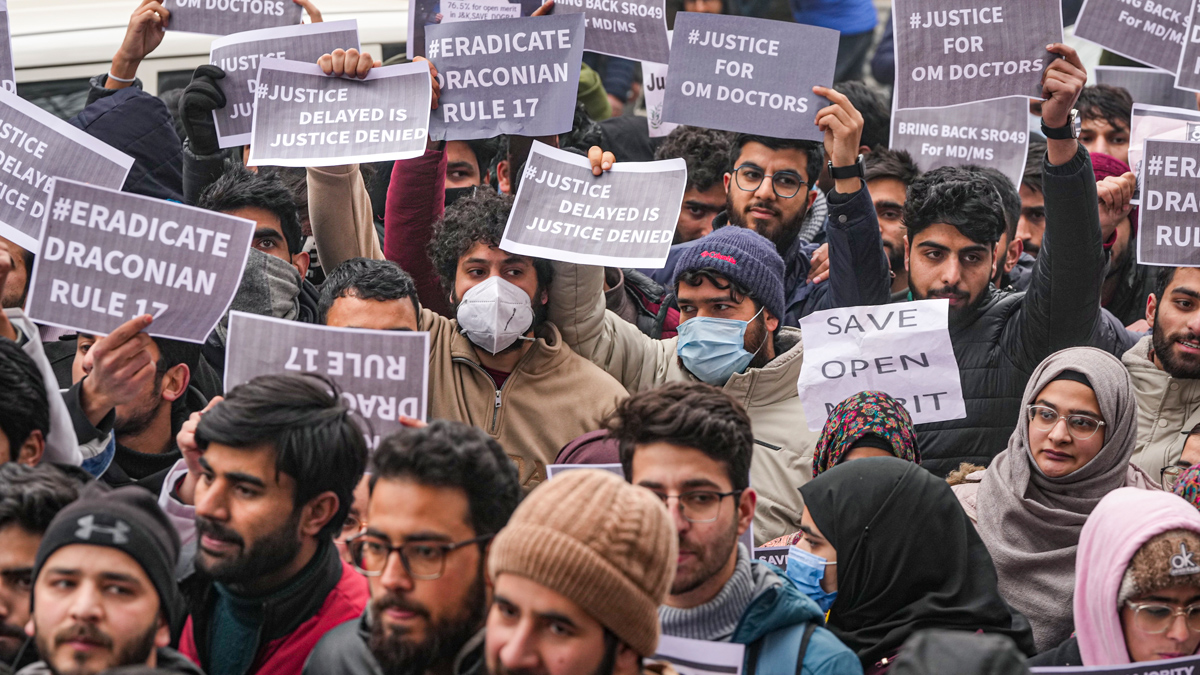Discrepancies between official statements spark criticism, political backlash, and public uncertainty over reforms in the reservation system.
By – Javid Amin | Editor | Srinagar | June 10, 2025
A Policy Adrift in Political Waters
In a politically sensitive region like Jammu & Kashmir, policy reforms are never merely administrative. They often reflect deeper crises tied to regional identity, social justice, and governance credibility. Today, the controversy surrounding Jammu and Kashmir’s reservation policy reforms has turned into a full-blown crisis of trust and accountability.
Conflicting official statements about the Cabinet Sub-Committee (CSC) on reservation reforms have raised serious concerns about transparency, intent, and political will. The Chief Minister, Omar Abdullah, previously declared a six-month deadline for the CSC report. Yet a contradictory reply from the Social Welfare Ministry denies any such timeline was ever officially set.
This back-and-forth has deepened public distrust, fueled student unrest, and opened up a wider debate on social inequality, certificate misuse, regional discrimination, and policy paralysis.
Six Months Later: Deadline or Deliberate Delay?
What the CM Promised:
“The Cabinet Sub-Committee will complete its report within six months. The aim is to deliver justice to all—on the basis of socio-economic indicators, not just geography or legacy.”
What the Social Welfare Ministry Wrote:
“There is no timeline defined in the formal government notification that created the CSC.”
This contradiction is more than just a bureaucratic oversight. It’s a symptom of deeper mismanagement and a broken chain of responsibility.
Background: Why the CSC Was Formed
The CSC came into existence due to increasing dissatisfaction with the outdated and uneven reservation framework in J&K.
The Existing Categories:
- Scheduled Castes (SC)
- Scheduled Tribes (ST)
- Other Backward Classes (OBC)
- Residents of Backward Areas (RBA)
- Economically Weaker Sections (EWS)
The Core Issues:
- Geographical Bias: Favoritism towards select regions.
- Certificate Manipulation: Rampant issuance of fake or politically motivated RBA/ST/SC certificates.
- Disregard for Economic Disadvantage: Economically backward families in unreserved zones are left out.
- No Recent Data: Lack of socio-economic surveys to justify allocations.
CSC’s Expected Role:
- Holistic review of reservation framework.
- Public consultation.
- Recommendations for inclusive, merit-based reform.
Voices from the Ground: What Stakeholders Say
Students:
Nusrat Bano (PG aspirant from Doda):
“We delayed applications waiting for reform. Now we’re stuck, with no clarity or answers.”
Academics:
“Education equity is impossible without a fair reservation system based on current ground realities.”
Civil Society Groups:
Jammu Youth Forum & Kashmir Policy Watch demand:
- CSC findings be published immediately.
- Clarification of CSC’s actual timeline and authority.
- White paper release and stakeholder inclusion.
Political Fallout: From Criticism to Chaos
Aga Syed Ruhullah (NC MP):
“It’s either incompetence or deliberate deception. Either way, it’s a betrayal.”
Sajad Lone (People’s Conference):
“Lakhs of students suffer. These aren’t bureaucratic errors. These are lives.”
Political parties across J&K have united on this issue, criticizing the government for ambiguity, inaction, and dishonesty.
Legal Dimensions: Is This a Violation?
Advocate Bashir Ahmad Wani (Srinagar):
“The CM’s public statement may carry administrative legitimacy. Courts may intervene if there’s proof of bias, neglect, or constitutional violation.”
The judiciary remains a possible route for citizens or NGOs to press for transparency, especially if maladministration or injustice can be proven.
Real Impact: How Ordinary Kashmiris Are Affected
Case Study: Border Neglect
Farooq Choudhary (Poonch social worker):
“We live on the margins—literally and politically. RBA certificates mean nothing if they aren’t respected.”
Case Study: Urban SC/ST Youth Ignored
Urban poor SC/ST youth say rural beneficiaries receive more attention despite similar economic hardships.
Case Study: Kashmiri Pandit Returnees
Many returnees from the displaced Pandit community feel alienated from reservation benefits due to vague categorization and lack of documentation.
Beyond Reservation: Larger Crises in Kashmir
Drug Menace in Kashmir:
- Youth unemployment and policy paralysis feed addiction.
- Lack of mental health services and social mobility lead many into substance abuse.
Immoral Activities Rise:
- Surging due to lack of direction, jobs, or purpose.
- Young people are more vulnerable to trafficking, crime, and radicalization.
Business Crash Post-370:
- Article 370 revocation disrupted traditional markets.
- Tourism and handicraft sectors haven’t recovered.
Natural Disasters & Climate Impact:
- Floods, landslides, and harsh winters worsen socio-economic conditions.
- Remote areas receive inadequate disaster relief.
The Common Thread: Policy Gaps & Poor Governance
What Needs to Happen Now
Transparent Governance:
- Make CSC documentation public.
- Issue press releases monthly.
Data-Driven Reform:
- Launch a socio-economic survey post-Article 370.
- Use AI & GIS mapping to redefine backward zones.
Mixed-Indicator Reservation:
- Combine economic, geographic, and social indicators.
- Ensure even urban poor and border communities are covered.
Community Engagement:
- Hold public hearings.
- Involve student unions, NGOs, and marginalized voices.
Broader Implications: A Defining Test of State Credibility
This episode isn’t just about reservations. It is about how Kashmir is governed post-Article 370. Miscommunication, delays, and contradictions suggest a crisis of governance and credibility.
Fixing the reservation policy isn’t a checkbox. It is a signal to:
- Promote social justice.
- Repair public faith.
- Revive youth aspirations.
Failing to act could escalate:
- Student protests
- Legal challenges
- Further disenfranchisement
Bottom-Line: Reform Now or Regret Later
The CSC controversy is not merely a policy blunder. It’s a reflection of the larger administrative vacuum in Jammu and Kashmir.
Unless the government:
- Clarifies its stance,
- Releases the CSC report,
- And involves the public in the reform process,
…the reservation system will continue to be a source of social injustice and unrest.
This is more than a missed deadline. It’s a missed opportunity.




